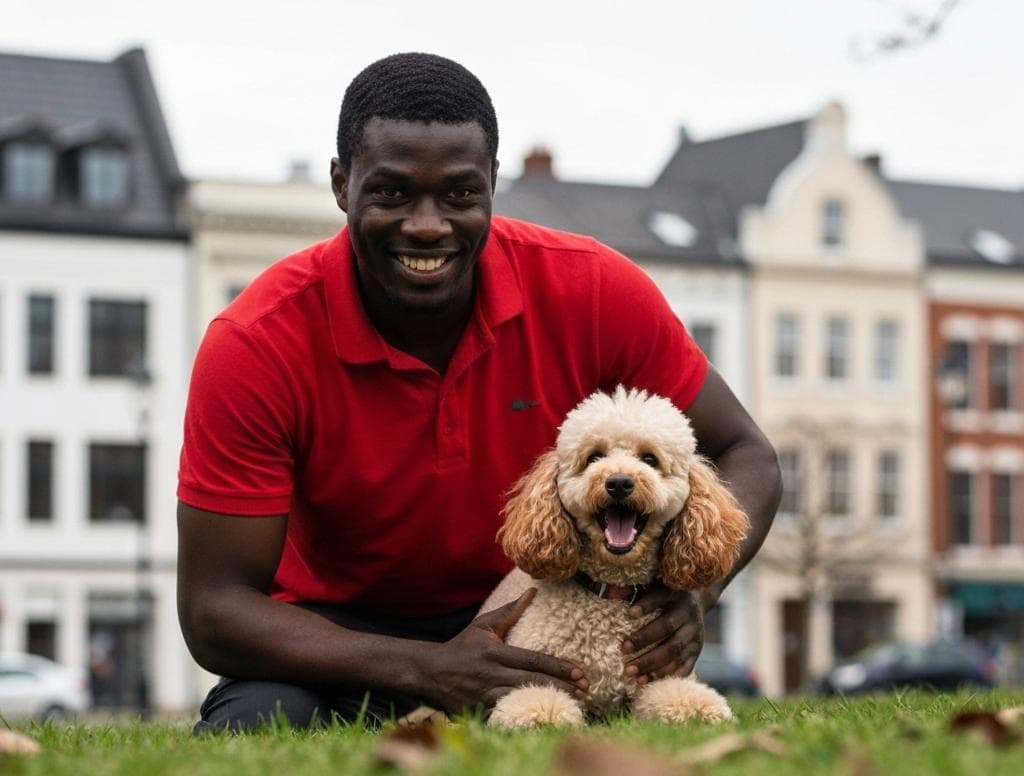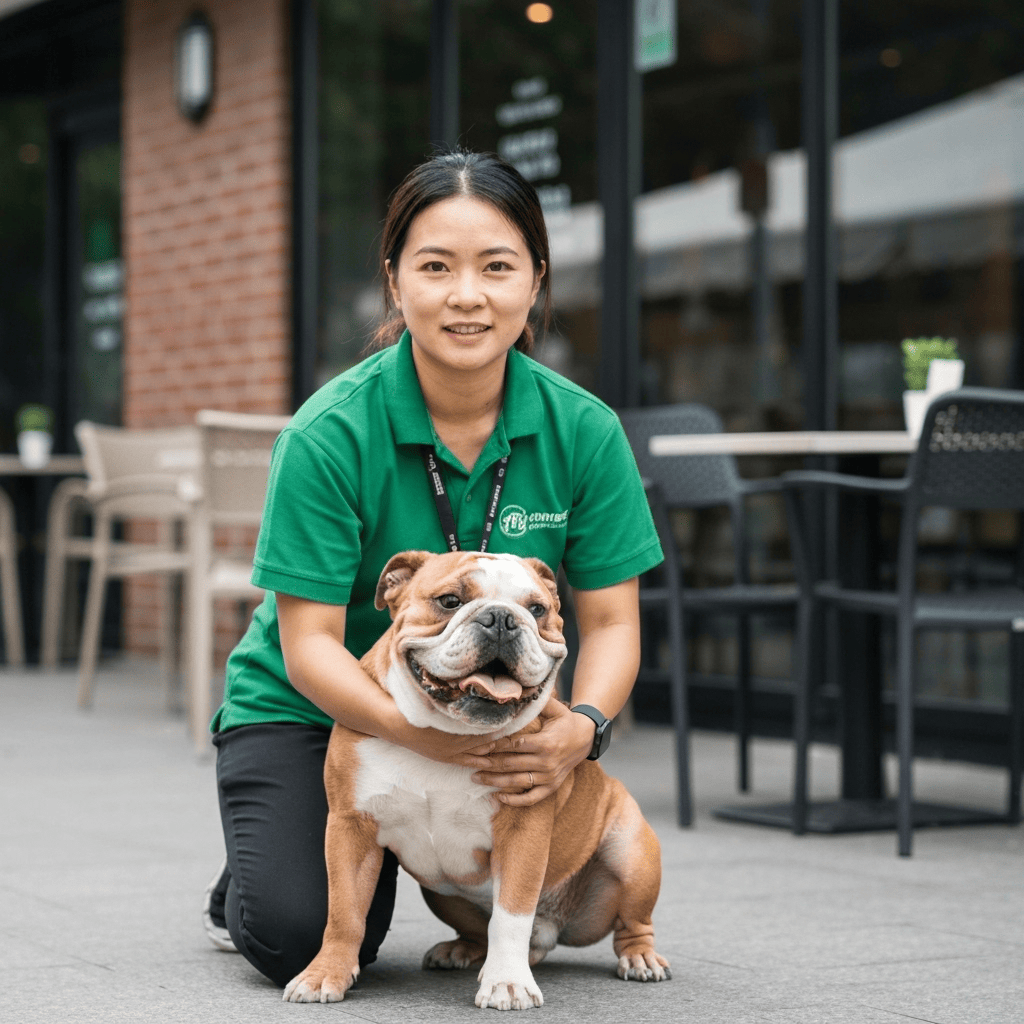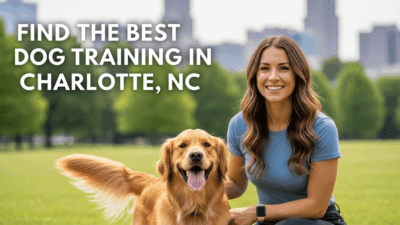Your Complete Guide to Choosing a Dog Trainer in Charlotte
Living with a dog in Charlotte means navigating busy sidewalks in South End, relaxed patios in NoDa, lively Plaza Midwood streets, and weekend crowds in Ballantyne. Your dog needs to handle elevator rides, greenway joggers, and those surprising scooters that zip by without warning.
Finding the right trainer makes all the difference between a dog who struggles with city life and one who confidently walks beside you through uptown crowds. This guide breaks down what you need to know about choosing local trainers, understanding costs, and working with Charlotte’s specific rules and challenges.
How to Choose the Right Trainer
The best trainers understand that Charlotte dogs face unique challenges. Your pup might be perfect at home but turn into a pulling, barking mess when a cyclist speeds past on the Rail Trail. A good trainer builds skills your dog can actually use in these real situations.
Look for trainers who use positive, reward-based methods. These approaches teach your dog what you want them to do instead of just punishing what you don’t want. When you meet with potential trainers, ask how they handle stress and fear. The right answer involves patience, building confidence, and setting your dog up for success rather than forcing them through scary situations.
Certifications can tell you a lot about a trainer’s commitment to learning. You might see designations like CPDT-KA, KPA-CTP, IAABC-CDBC, or CBCC-KA. These show the trainer has studied current methods, follows ethics guidelines, and passed competency tests. While not required, they’re a good sign that someone takes their profession seriously.
Think about what format fits your life. In-home training works great for house manners, door greetings, and neighborhood walking skills. Group classes help with basic obedience and socializing around other dogs, plus they’re usually more affordable. Private lessons move faster on specific problems like reactivity or separation anxiety. Board and train programs can jump-start progress for busy families, but make sure there’s solid follow-up coaching to keep results when your dog comes home.
Ask about insurance too. North Carolina doesn’t require it, but responsible trainers carry liability coverage. If someone offers overnight boarding, they may need to follow state boarding kennel rules through the NC Department of Agriculture’s Animal Welfare Section at NCDA&CS Animal Welfare Section.
Common Training Methods That Work in Charlotte

Positive reinforcement training uses treats, toys, and praise to build the behaviors you want. This approach works especially well for city challenges like staying calm when strangers want to pet your dog or walking nicely past the food trucks in South End.
Behavior modification takes a more structured approach for dogs with fear, reactivity, or aggression issues. Good trainers use careful desensitization and counterconditioning, which means gradually exposing your dog to triggers at a distance where they can stay calm and learn new responses. This process takes time, but it’s the safest way to help anxious or reactive dogs.
Puppy training focuses on the critical early months when your dog is learning about the world. Good puppy programs cover house training, bite inhibition, handling, and socialization. In Charlotte, this might mean starting with quiet neighborhood walks and gradually building up to busier areas like the less-crowded sections of Little Sugar Creek Greenway.
If you’re interested in service dog training or therapy dog work, look for trainers with specific experience in these areas. These dogs need rock-solid public manners and the ability to work calmly in Charlotte’s busy venues, from hospitals to airports.
Charlotte and Mecklenburg County Rules You Need to Know
Mecklenburg County requires dogs to be on leash or otherwise restrained when they’re off your property. This means planning to keep your dog leashed in parks, on greenways, and in neighborhoods unless you’re inside a designated off-leash dog park.
Your dog needs current rabies vaccination – that’s North Carolina law. Keep the rabies tag handy since animal control officers can ask for proof if there’s ever a complaint or incident. You can learn more from NCDHHS Rabies Control.
Nuisance barking can get you in trouble, especially in apartments and townhomes where neighbors are close. A trainer can help with enrichment activities, management strategies, and teaching your dog to settle calmly when alone.
If your trainer wants to hold classes in public parks, they may need county permission. Personal practice is fine as long as you follow posted rules and clean up after your dog.
What Dog Training Costs in Charlotte (2025)
Training prices vary based on the trainer’s experience, session length, and format. Here’s what most Charlotte dog owners can expect to pay:
| Service Type | Average Cost (Charlotte Area) |
|---|---|
| Group classes, 4 to 6 weeks | $170 – $320 |
| Private lessons, 60-90 minutes | $110 – $185 per session |
| Puppy training package, 4 to 6 visits | $350 – $700 total |
| Day training, trainer works dog plus handoff | $500 – $950 per week |
| Board and train, 2 to 4 weeks | $2,000 – $4,500 total |
| Behavior consult for fear or reactivity | $140 – $260 initial session |
Expect travel fees for in-home sessions if you live outside central Charlotte. Trainers with advanced credentials or those handling complex behavior issues typically charge more. Always ask for a written breakdown of what’s included, how they measure progress, and what follow-up support you get.
Questions to Ask Before Hiring a Trainer
- What training methods do you use, and how do you handle dogs who are fearful or stressed?
- What credentials do you hold, such as CPDT-KA or IAABC-CDBC?
- Do you offer group classes, private lessons, or in-home training, and which would work best for my goals?
- How will you help my dog handle Charlotte’s specific challenges, like busy sidewalks and crowded patios?
- For behavior issues like reactivity, what’s your approach and what safety measures do you use?
- How will we track progress, and what does success look like for my dog?
- Do you carry liability insurance?
- If you offer board and train, how will you teach me to maintain the results at home?
- Can I observe a class or meet for a consultation before committing?
Helpful Charlotte Resources for Dog Owners
- Mecklenburg County dog parks with fenced areas and posted rules: Dog Parks by Mecklenburg County Park and Recreation
- Local dog park guide with details about amenities and locations: Charlotte's Dog Parks
- Little Sugar Creek Greenway for leashed training walks: Little Sugar Creek Greenway on Carolina Thread Trail
- Rabies requirements and vaccination info: NCDHHS Rabies Control
- State boarding facility regulations for trainers who board dogs: NC Animal Welfare Section
- Local animal services information and resources: Charlotte-Mecklenburg Animal Care & Control

Common Questions About Dog Training in Charlotte
How much does in-home dog training cost?
Most in-home sessions in Charlotte run $110 to $185 per visit. The price depends on how far the trainer has to travel, how long the session lasts, and the trainer’s experience level.
Is in-home training worth the extra cost?
It often is, especially for house training, door manners, or leash walking in your own neighborhood. Working in your actual environment means your dog learns the skills exactly where they need to use them.
Can I hire someone to house train my dog?
Yes, many trainers offer puppy packages or day training that focuses on house training and crate routines. But remember, you’ll still need to stay consistent every day to keep the progress going.
What’s the 3-3-3 rule for dogs?
This guideline suggests new dogs need about 3 days to decompress, 3 weeks to learn your routines, and 3 months to fully settle in. For Charlotte dogs, this means starting training in quiet areas and slowly building up to busier places like South End or the greenways.
How long does dog training take?
Basic obedience usually shows good progress in 4 to 8 weeks with daily practice. Behavior problems like reactivity or anxiety take longer and need careful, step-by-step work.
What should I bring to group classes?
Pack a regular collar or harness, a 6-foot leash, lots of small training treats, water, and vaccination records if the trainer requests them. Leave retractable leashes at home – they’re not safe in group settings.
What’s Charlotte’s leash law?
Mecklenburg County requires dogs to be restrained when off your property. Keep your dog leashed in public spaces and only let them loose in designated off-leash dog parks. Check current dog park locations at Mecklenburg County Dog Parks.
Do I need a dog license in Charlotte?
As of 2025, there’s no general dog license requirement in Mecklenburg County. You do need current rabies vaccination – that’s state law – and should keep the rabies tag handy. Check with Charlotte-Mecklenburg Animal Care & Control for any updates.
What vaccines does my dog need?
North Carolina requires rabies vaccination. Your vet may recommend others based on your dog’s lifestyle and risk factors. For official state requirements, see NCDHHS Rabies Control.
Do dog trainers need licenses in North Carolina?
There’s no special state or local license required for dog trainers. However, trainers who board dogs overnight may need to meet state boarding facility standards through NCDA&CS. Many good trainers pursue voluntary certifications like KPA-CTP or CBCC-KA.
Where can I practice off-leash recall?
Fenced dog parks are your best bet for off-leash recall practice. Keep sessions short and positive, and be considerate of other dogs and owners. For park locations and rules, visit Mecklenburg County Park and Recreation.
Can I train my dog at Charlotte’s dog parks?
Most dog parks welcome casual training and focus games as long as you follow posted rules, share space with others, and don’t monopolize equipment. For a list of local options, check out Charlotte’s Dog Parks.
What trails allow dogs for training walks?
Charlotte doesn’t have beaches, but many greenways welcome leashed dogs. Little Sugar Creek Greenway offers good controlled exposure to cyclists and joggers. Find details at Carolina Thread Trail.
Do trainers need insurance in Charlotte?
Insurance isn’t legally required, but many venues ask for proof of liability coverage. It also protects both trainer and clients if accidents happen during sessions.
Are there quiet places to start training before tackling busy areas?
Absolutely. Start with calm residential streets or small neighborhood parks during off-peak hours, then gradually work up to busier greenway sections and popular spots like the patios in NoDa or South End.
Finding the right trainer and approach can transform both your dog’s behavior and your relationship together. Charlotte offers plenty of opportunities to practice and enjoy life with a well-trained dog, from quiet neighborhood walks to busy festival crowds. If you want to learn more about advanced trainer credentials, explore options like CPDT-KSA and CTC to understand what different levels of education mean.
